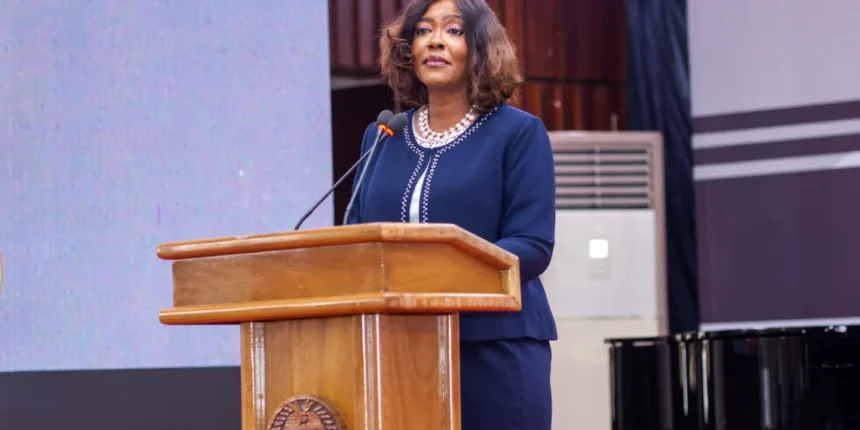WA, Ghana – The President of the Ghana Bar Association (GBA), Efua Ghartey, has publicly criticized President John Dramani Mahama’s decision to remove Chief Justice Gertrude Torkornoo, calling the process opaque and a potential threat to judicial independence. Speaking at the GBA’s Annual General Conference in Wa on Monday, September 15, 2025, Ghartey expressed alarm over what she described as a lack of fairness and transparency in the dismissal, sparking a heated debate about the balance of power in Ghana’s democracy.
The removal of Chief Justice Torkornoo, a respected jurist known for her efforts to modernize Ghana’s judiciary, has sent shockwaves through the legal community. Torkornoo, appointed in 2019, spearheaded initiatives to reduce case backlogs and improve access to justice through digital reforms. Her abrupt exit, announced by the presidency without detailed public justification, has raised eyebrows, particularly as it comes early in Mahama’s second term following his return to power in January 2025.
Addressing hundreds of lawyers, judges, and legal scholars at the conference, Ghartey minced no words. “The process leading to the Chief Justice’s removal raises serious questions about fairness and transparency,” she said. “The judiciary is the bedrock of our democracy, and any action that undermines its independence must be scrutinized. This is not just about one individual—it’s about the integrity of our institutions.”
Context of the Controversy
Ghana’s judiciary has long been viewed as a pillar of the country’s democratic system, often navigating politically charged cases with relative autonomy. The Chief Justice, as head of the judiciary, plays a critical role in ensuring impartiality and upholding the rule of law. Under the 1992 Constitution, the president has the authority to appoint and, under specific circumstances, remove the Chief Justice, but such decisions must follow due process, including consultation with the Judicial Council and, in cases of removal, evidence of misconduct or incapacity.
Details surrounding Torkornoo’s removal remain scarce. The presidency issued a brief statement citing “national interest” but provided no specifics on the grounds for her dismissal. This lack of clarity has fueled speculation, with some analysts suggesting political motivations tied to upcoming high-stakes cases, including disputes over recent economic policies and anti-corruption investigations. Others point to tensions between the executive and judiciary during Mahama’s first term (2012–2017), when similar concerns about judicial independence surfaced.
Ghartey’s remarks reflect broader anxieties within Ghana’s legal fraternity. The GBA, which represents over 6,000 lawyers nationwide, has historically advocated for judicial reforms to shield the courts from political interference. In her speech, Ghartey called for stronger checks, such as mandatory parliamentary approval for judicial removals, to prevent what she termed “executive overreach.” She also urged the government to provide a full account of the decision, warning that secrecy risks eroding public trust in the judiciary.
A Polarized Response
The controversy has divided opinions across Ghana. Supporters of President Mahama argue that the removal may be part of a broader effort to reset the judiciary and align it with his administration’s priorities, including tackling corruption and improving governance. Mahama, who campaigned on a platform of “resetting” Ghana’s institutions, has emphasized the need for accountability across all sectors. Some within his National Democratic Congress (NDC) claim Torkornoo’s leadership faced internal criticisms, though no public evidence of misconduct has emerged.
Critics, however, see the move as a dangerous precedent. “This is a direct attack on the judiciary’s independence,” said Kofi Abotsi, a constitutional law expert and former GBA executive. “Without transparent justification, the public is left to assume this is political score-settling. That’s a slippery slope for any democracy.” Abotsi and others have called for the Judicial Council to clarify its role in the process, as its silence has only deepened suspicions.
Implications for Ghana’s Democracy
The timing of the removal is particularly sensitive. Ghana is grappling with economic challenges, including inflation and debt restructuring, alongside social issues like illegal mining (galamsey), which has drawn government crackdowns. The judiciary is expected to play a pivotal role in adjudicating disputes arising from these policies, making its independence a focal point. Torkornoo’s removal risks casting a shadow over upcoming rulings, with fears that her successor—yet to be announced—may face pressure to align with executive interests.
The GBA’s stance could galvanize further action. Sources at the conference suggest the association is considering a formal resolution or petition to challenge the removal, potentially escalating the matter to the courts or Parliament. Ghartey hinted at this possibility, stating, “The GBA will not sit idly while the rule of law is tested. We will engage all stakeholders to ensure justice prevails.”
A Call for Accountability
As the debate unfolds, civil society groups and international observers are watching closely. The Ghana Center for Democratic Development (CDD-Ghana) issued a statement urging the government to provide a detailed explanation to avoid perceptions of authoritarianism. “Transparency is not optional in a democracy,” the CDD said. “The public deserves to know why such a significant decision was made.”
For now, the legal community awaits the government’s next move. President Mahama has yet to respond directly to the GBA’s criticisms, but pressure is mounting for a clear justification. Meanwhile, Ghartey’s outspoken critique has positioned the GBA as a key player in what could become a defining moment for Ghana’s judiciary and its democratic credentials.




